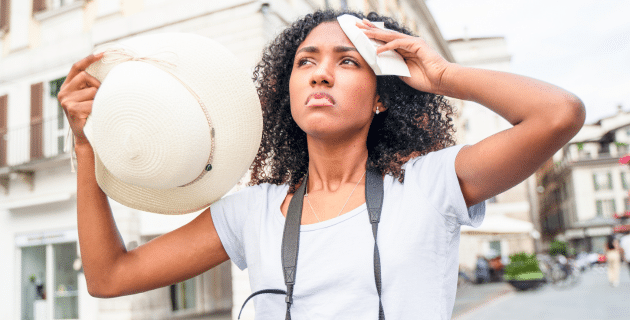It’s going to be a hot one. When you’re traveling, that can be a problem. Vacationing in extreme heat is not only uncomfortable, but it can put you in real danger. Here’s how to keep your cool when you’re traveling or vacationing in extreme heat this summer.
Avoid the hottest hours.
The sun is highest at midday but that’s not when the air is the hottest. While it depends on your geographic location, generally the hottest times of day are between 3 and 6 pm. It’s a good idea to avoid being outside during those hours. Take a siesta in your vacation home. Plan an itinerary that includes outdoor adventures earlier in the day or in the evening. The advantage of traveling in the summer is that sunset is very late in some countries so there’s extended daylight well into the evening hours.
Pro Tip: Check for evening discounts. Some attractions may offer them.
Wear the right clothes.
Look for white or light-colored clothing made of rayon, cotton, or linen. Those fabrics will allow heat to pass through and keep you cooler. Avoid synthetics and dark colors which absorb heat. Choose loose styles that allow your body the space to “breathe” and sweat. Don’t forget your hat and sunglasses; both will help.
Stay hydrated.
You sweat more when it’s hot, and so you need to replenish the water and nutrients lost by your body. Try to drink every 15-30 minutes even if you’re not thirsty. Stick to water or sports drinks that have electrolytes. Avoid caffeinated drinks and alcohol, both of which are dehydrating.
Pro Tip: Set reminders on your phone to hydrate. There are apps available that can make it fun.
Choose the right foods.
When we eat a lot of heavy foods, our bodies work hard to digest them. In the process, that creates heat. Choose lighter fare instead. Hydrating foods like fruits and salads do double duty and provide extra water. Cold foods, like ice cream and smoothies, naturally help to cool down your body. Salty snacks such as salted nuts, popcorn, and trail mixes help replace electrolytes.
Get wet.
If you can’t get to a swimming pool to cool down, there are some creative options. Take a cold shower or dunk your head under the faucet. Wet hair will make breezes feel cool. Hold your wrists under cool running water. Wet your hat or wear a damp evaporation scarf. All of this will help lower your body’s core temperature.
Pro Tip: Invest in a breeze fan and bring the misty breeze along with you.
Use an umbrella.
Think of it as your personal shady spot. By keeping the sun’s rays off you, an umbrella will make you cooler. Heading to the beach? Bring a tent or umbrella for a similar effect. In general, it’s a good idea to seek out shade wherever you go.
Look for places to cool off.
Look for malls, libraries, museums, and galleries that can offer quick relief. Plan for those inside activities during the hottest part of the day. You may want to call ahead to confirm that they have air conditioning. It is not necessarily the norm in countries outside the U.S.
Don’t overdo it.
Exercise raises your core body temperature. Limit physical activities in the heat. Avoid climbing hills or doing any activities that require exertion. These activities will only put extra stress on your body as it’s trying to deal with the heat.
Take care of your car.
Extreme heat can affect your car, too. If you’re on a road trip, make sure to be aware of the effects. The heat could make it hard for your battery to hold a charge. It can affect tire pressure and even cause tires to overheat, putting you at risk for a blowout. Air conditioning puts extra stress on the engine. Before you plan a road trip in the summer, have your vehicle checked to make sure it’s in its best shape to travel.
Acclimate yourself before your trip.
You can adjust your body to the heat before your vacation. Go to a sauna or steam room. Work up to spending 30-40 minutes in that sauna/steam room over 7-10 days. It allows your body to get used to the heat.
Beware of heat stroke.
Know the signs of heat stroke and a place where you can get medical attention while traveling. Children and the elderly are especially vulnerable so you will want to take extra precautions to keep them cool.
Safe travels and enjoy the journey!
This article is furnished by California Casualty, providing auto and home insurance to educators, law enforcement officers, firefighters, and nurses. Get a quote at 1.866.704.8614 or www.calcas.com.
- California Casualty Earns Financial Stability Rating® of A, Exceptional, From Demotech, Inc. - April 28, 2025
- Music & Arts Grant Recipients – 2024 - December 13, 2024
- Understanding Auto and Home Insurance Rate Changes - December 3, 2024

